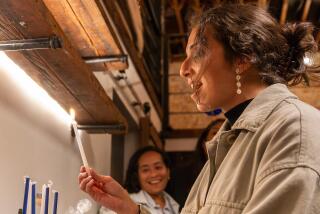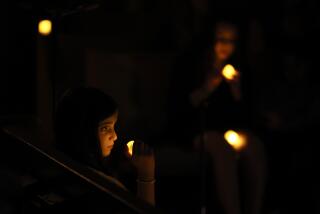Ethnic Harmony
- Share via
Los Angeles is keenly aware of its status as a melting pot, a destination for diverse ethnicities and ideologies. The ancient city of Jerusalem, however, illustrates that the melting pot model is hardly unique to American cities.
That city’s inherent diversity fuels the freely culture-crossing tendencies of the Israeli group Guy Kark and Between Times, which will make its U.S. debut Thursday at the Skirball Cultural Center.
The concert kicks off a summer Sunset Concert Series at a friendly price--free. As heard on last year’s album, “Canaan,” Between Times happily veers over borders, playing music with Jewish and Arab strains and with an instrumentation that includes oud, santur, violin and Celtic harp.
The band’s built-in diversity and musical style are natural, Kark said.
“Living in Israel, even if you don’t deal with music, you’re dealing with cross-cultures every day,” he said. “I was born in Jerusalem, which I think is the most multiethnic city in the world. You have monks and monasteries and mosques and synagogues, everything you can think of, in such a small area.”
Instruments that we take for granted as representing a particular geographical region have historic roots in the Middle East, he noted. The Celtic harp, for example, might seem a non sequitur in an Israeli band.
“If you go back to the roots of harps, you can find carvings in ancient Egypt,” he said. “That’s where this instrument came from and came to the Celtic area much later.”
The Western violin and other stringed instruments can be traced to much older Middle Eastern instruments.
“If you look at it in a long view, there are instruments and musical influences that came to Europe from the Middle East,” he said. “In the last hundreds of years, the influences also are coming back.”
Mostly self-taught, Kark began playing violin and shifted to guitar. Along the way, he picked up other instruments, including the Turkish saz. Throughout, he has been driven by a curiosity about music in the broadest sense.
“From an early age, I was listening to almost any sort of music I could put my hand on, and that’s the same until today,” he said.
After studying composition and Arab music at the Rubin Academy in Jerusalem, Kark went on to compose for television, theater, Between Times, which he formed in 1992, and Duo Esperanto.
“Dealing with music and creating music and being in a musical surrounding is a real privilege,” he said in a telephone interview from Colorado, a stop on his current tour with Duo. Music is “the only art that you can’t touch. It floats somewhere. You can record it, but it’s not real. There’s just a certain moment that you catch, and a second later, it can feel completely different. It’s magic.”
The point is not lost on Kark that music can be a source of cultural mediation and healing in a strife-torn area.
“In a way, music helps people to look into one another’s tradition and see the beauty that is in there,” he said. “I do feel that, in the last few years, people in Israel are more open. They are looking at the other people and starting to understand that they have a lot to say in their own place, which is quite encouraging.”
BE THERE
Guy Kark and Between Times, Thursday at 7:30 p.m., Skirball Cultural Center, 2701 Sepulveda Blvd., Los Angeles. Free admission; parking $5. (310) 440-4500.
More to Read
The biggest entertainment stories
Get our big stories about Hollywood, film, television, music, arts, culture and more right in your inbox as soon as they publish.
You may occasionally receive promotional content from the Los Angeles Times.










